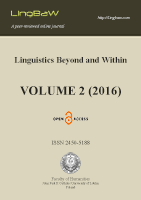Intensional profiles and different kinds of human minds. “Case studies” about Hungarian imperative-like sentence types
Intensional profiles and different kinds of human minds. “Case studies” about Hungarian imperative-like sentence types
Author(s): Gábor Alberti, Judit Kleiber, Zsuzsanna Schnell, Veronika SzabóSubject(s): Semiotics / Semiology, Cognitive linguistics, Pragmatism, Cognitive Psychology, Clinical psychology, Methodology and research technology
Published by: Wydawnictwo KUL
Keywords: discourse representation/markers; mind representation; dynamic pragmatics; autism;
Summary/Abstract: The paper offers such description of some imperative-like sentence types in potential well-formed Hungarian utterances which includes a parallel representation of the linguistically encoded intensional profiles of the sentence types and actual information states in potential interlocutors’ minds. In our representational dynamic pragma-semantics framework ℜeALIS, we demonstrate the intensional profiles of the five basic and two “fine-tuned” sentence types as members of a system enabling addressers’ of utterances to express their beliefs, desires and intentions concerning the propositional content of the given utterances as well as the addressees’ and other people’s certain beliefs, desires and intentions (concerning the propositional content, too, or each other’s thoughts). We also provide “case studies” in which actual beliefs, desires and intentions in potential interlocutors’ minds are compared to the linguistically encoded intensional profiles of Hungarian imperative-like sentence types. In this context, the listener’s task is to calculate the speaker’s intentions (and hidden motives) on the basis of the mismatches that this comparison reveals. The paper concludes with an insight into our attempts to model the mind of individuals living with Autism Spectrum Disorder. This latter sub-project is relevant since our framework provides solutions to pragmatic-semantic phenomena “at the cost” of undertaking the complex task of actually representing the structure of the human mind itself – which is not impossible but requires an adequate decision of the level of abstraction and the components to be used.
Journal: Linguistics Beyond and Within (LingBaW)
- Issue Year: 2/2016
- Issue No: 2
- Page Range: 6-26
- Page Count: 21
- Language: English

